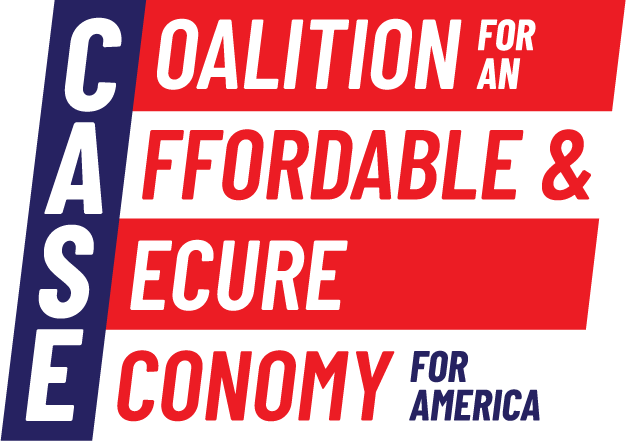Families Need Relief From High Costs; Enacting Across-The-Board Tariffs Could Further Hurt Their Pocketbooks
On February 1, President Trump announced a 25% tariff on imported goods from Canada and Mexico and a 10% tariff on all goods from China. The tariffs on Canada and Mexico were delayed but tariffs on Chinese imports took effect on February 4. With Canada and Mexico’s month-long delay expiring, the tariff suspension will hit American consumers in early March.
Americans are still grappling with high inflation and costs for everyday household items – and they sent new leaders to Washington with a mandate to make life less expensive. Inflation accelerated in January, which may explain waning consumer confidence. A pollster who worked for President Trump’s campaign found in February that about 59% of voters are worried about their personal financial situation with the cost of living being the top worry for both Trump voters and swing voters.
And a growing chorus of voices are expressing concerns that broad-based tariffs would ultimately raise prices on everyday household items and hurt hard working American families. Read what members of Congress and economic policy experts are saying:
Senator John Cornyn (R-TX):
“[T]here comes a point at which tariffs add cost to consumers.” (The Texas Tribune, 2/1/25)
Senator Ron Johnson (R-WI):
“I share the market’s concerns … [I hope] we don’t end up with long-term 25 [percent] tariffs against each country. It’s gonna hurt Americans, American companies, American exporters, it’ll hurt American consumers long term.” (The Hill, 2/3/25)
“Even the president has admitted there’s going to be pain [from tariffs], and I think in Wisconsin we’re going to have a lot of people experiencing that pain.” (The Wall Street Journal, 2/17/25)
Senator Rand Paul (R-KY):
“Tariffs are simply taxes. Conservatives once united against new taxes. Taxing trade will mean less trade and higher prices. We won the last election by complaining about Democrats’ policies, which gave us high prices. Tariff lovers will be forced to explain the persistence of high prices.” (X, 2/1/25)
Susan Collins, President, Federal Reserve Bank of Boston:
“The kind of broad-based tariffs that were announced over the weekend, one would expect to have an impact on prices … With broad-based tariffs, you actually would not only see increases in prices of final goods, but also a number of intermediate goods.” (CNBC, 2/3/25)
Mark Zandi, Chief Economist, Moody’s:
“Broad-based tariffs, which is what I think we’re talking about here, will result in higher prices for the things that we import. American consumers will need to pay more for those things, it will add to inflationary pressure. So, you know, that’s the evidence that we got from the tariffs that were imposed under President Trump’s first term. Those tariffs were mostly on China, smaller than what I think he’s considering here, but the evidence was clear. It raised inflation, raised prices. And I don’t expect anything different, any different outcome here. It’ll add to inflationary pressures.” (CNN, 1/27/25)
Pete Sepp, President, National Taxpayers Union:
“Tariffs are a tax increase on American households and manufacturers. Putting a tax on goods Americans depend upon jeopardizes the Make America Great Again agenda, including the Trump Administration’s plan to unleash American energy and its efforts to lower the cost of housing, food, and fuel. Instead, American families will suffer under the crushing weight of tarifflation. Tariffs also put American farmers and ranchers who sell in the global marketplace at risk of suffering retaliatory tariffs.” (National Taxpayers Union Press Release, 2/1/25)
Mary Lovely, Senior Fellow, Peterson Institute for International Economics:
“[F]or the average household, [the latest round of tariff threats] would be about $1,200 more per year, or a consumer loss of $1,200. So you can think about $100 a month. … [T]hat number would rise if President Trump then goes ahead with other threats that he has made to raise tariffs, for example, on the European Union.” (PBS, 2/2/25)
Douglas Irwin, Trade Policy Historian, Dartmouth College:
“If there is any doubt that the cost of the tariff is passed through to consumers, the price of propane (to heat my house) just went up by the amount of the tariff.” (Bloomberg, 2/2/25)
James Knightley, Chief International Economist, ING:
“The burden of higher tariffs falls disproportionately on poorer households because they typically spend a bigger share of disposable income than wealthier people on physical goods rather than services.” (Bloomberg, 2/2/25)
Brian Peck, Executive Director, University of Southern California’s Center for Transnational Law and Business:
“If there is a significant increase in tariffs … Those costs will likely be passed onto U.S. consumers and businesses.” (CBS, 1/31/25)
###

